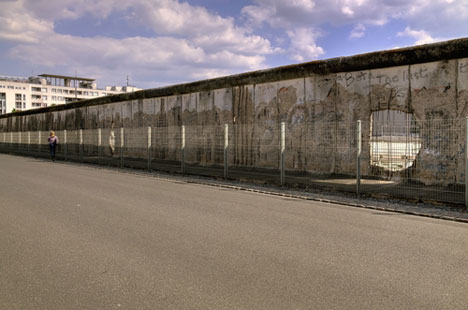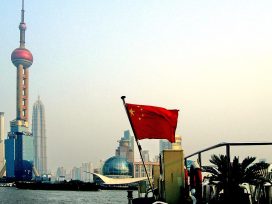Readers of a certain age may remember the widespread enthusiasm with which western Europe, back in 1989, greeted the fall of the Berlin Wall and the associated changes of regime that accompanied it (though each with its own particular origins and momentum) in Czechoslovakia, Hungary, Poland and, more ambiguously perhaps, Bulgaria and Romania. Most of these states experienced a lively and apparently healthy democratic process in the decade that followed, with a good deal of volatility in evidence and the emergence of Christian democratic, national-conservative and liberal formations alongside a new element claiming to represent social democratic values, though in many cases emerging from the ranks of the pro-reform segments of the old communist parties.

Remnants of the Berlin Wall. Photo: MagMac83. Source:Shutterstock
Things were undoubtedly quite tough for many in the first years after communism (not that they hadn’t been before) as social protections were eroded or dismantled but there was little sign that any of the electorates really wanted to return to the communism they had shrugged off in 1989 – Czechoslovakia, where the communists retained a strong electoral base, might be a partial exception: the party still scores ten to fifteen per cent in elections in the Czech Republic.
It was during the first postcommunist decade that some of the eastern Europe “old hands” – notably the journalist and historian Timothy Garton Ash, who also taught us that it might be more correct to call the region Central Europe – first began to lecture western Europeans about their tardiness in welcoming the newly democratic states, in particular Poland, the Czech Republic, Slovakia and Hungary, whose democratic intellectuals TGA tended to be on intimate terms with, into full membership of “the club”, that is the European Union (they themselves often prioritised NATO membership).
Garton Ash’s points of argument could certainly not be reduced to just two, but there are two I particularly remember from his writings of that period: first that we in the West, or some of us, had encouraged the dissidents at a time when they were being persecuted and had cheered them on when they overthrew the communist regimes – so why should we not invite them now to fully participate in multinational democratic institutions? Second, the argument from culture: these Central European states which we had categorized as eastern (that is, oppressed, backward, and aesthetically unrelentingly grim) had, in fact, only been under the communist yoke for forty or so years, a very short time in history. Going further back they had been integrated in western civilization (Christendom), had, for example, fully experienced the Renaissance and had been historically (in the case of Poland, Hungary, the Czech Republic and Slovakia) faithful, largely, to the Latin Christian tradition and, before the disaster of 1945-1947, to the liberal and democratic parliamentary one. They had, the argument went, been held against their will for four decades in the grip of an alien, eastern power, but all the while they had been, in the words of a book by Czech journalist, then stoker, then foreign minister Jiri Dienstbier (1937-2011), “dreaming of Europe”.
Now the Hungarian scholar István Pogány, writing in the website Social Europe, argues that, as evidenced by recent clashes between government and independent media in Hungary and Poland, “[i]n a number of important respects, political, cultural and social norms in eastern Europe are far removed from the liberal, cosmopolitan ideology that prevails, however precariously, in much of the western half of the continent.” He continues:
The existence of at least two widely divergent zones within Europe – in contrast to the largely fictive notion of a continent united by a common set of values – was amply illustrated in 2015 by the almost pathological hostility displayed by several East European governments and senior churchmen to the dramatic increase in the numbers of mostly Muslim asylum seekers entering Europe. No West European head of state emulated the Czech president, Milos Zeman, who declared in June 2015: “I do not want Islam in the Czech Republic”. No West European prime minister chose to follow the lead of Hungary’s premier, Viktor Orbán, who stated on 25 July last year: “we would like Europe to remain the continent of Europeans” and “we want to preserve Hungary as a Hungarian country”. No Catholic bishop in western Europe has publicly expressed views remotely similar to those of Bishop Lászlo Kiss-Rigó. In September 2015, Bishop Kiss-Rigó, whose Catholic diocese lies in southern Hungary, achieved a measure of international notoriety when he appeared to rebuke the Pope for urging Catholics to extend help to asylum seekers. The Pope “doesn’t know the situation”, stated Bishop Lászlo Kiss-Rigó, who went on to accuse the mostly Muslim refugees of wanting to “take over”.
According to Pogány, forty years of Soviet domination is not the only factor that has made Central Europe different. “In reality, the social, cultural and political ‘gap’ between East and West Europe has a much longer and much more complex history.” For most of the inter-war period, neither Poland nor Hungary was a properly democratic state. And against a historical background of quasi-imperial domination, resurgent nationalism (and perhaps a local Catholic church which did not, at any stage, have to come to terms with liberal secularism?) “it’s perhaps not surprising that a significant proportion of the Polish and Hungarian electorate should have opted for intensely nationalist and stridently populist parties (PiS and Fidesz, respectively) that are openly scornful of liberal democracy. Support for these parties – as well as for others even further to the Right, including Jobbik in Hungary and Kukiz’15 in Poland – has also been a reaction to economic insecurity or dislocation, particularly amongst various sectors of the population that have conspicuously failed to benefit from the economic opportunities opened up by the end of communism.”
Perhaps the most important sentence here is the final one, which could suggest that people’s voting behaviour may be motivated as much by their perception of their economic circumstances as by their political/cultural inheritance or any original sin of backwardness. The historic factors supposedly in operation in Hungary – the non-democratic inheritance, inwardness, hostility to non-nationals – have, if they are in operation now, presumably always been in operation and might be expected to manifest themselves at any time politically. Yet it was not until 2002 that Orbán’s Fidesz party – seen by Pogány as the particular villain of the piece – took power, and it lost it again for another six years in 2004. Indeed Hungary has twice had a centre-left prime minister and twice a centre-right prime minister since the first wholly free elections in 1990. Equally, though the national-conservative Law and Justice (PiS) party won last year’s general election in Poland, it was the liberal conservative and pro-European Civic Platform (PO) that dominated politics in the country for most of the previous decade. Could it be that, rather than there being any particularly strong and ineradicable innate tendencies to reaction in either Poland or Hungary, they are places where things happen and governments perceived to be not delivering (in the Polish case, it would seem, not delivering to those at the bottom of the heap) can quite dramatically lose elections? Places in fact much like other places we know.
It may well be the case, as István Pogány argues, that the notion of a continent united by a common set of values is “largely fictive”; others, however, might prefer to see it as an aspirational idea, which is not quite the same thing. The European Union aspires to have a common set of values (social solidarity, we shouldn’t forget, is supposed to be one of them, if we want the union to last). Of course no one likes preaching but it certainly is legitimate, from time to time, to sharply remind members who appear to be straying of the existence of those values to which, let us remember, they signed up not so long ago. But let’s keep things in perspective. The contagion of nationalism, xenophobia and dumb but bloody-minded populism is not just hovering over the centre of our continent. It can be observed too above France and above the Netherlands, even over Scandinavia, while in response to an economy which, in good times as well as bad, often seems reluctant to yield many of its fruits to the bottom third of society, “slightly constitutional” forces seem to be experiencing lift-off almost everywhere. Perhaps we should look to our glasshouses before we hurl too many of those big stones towards the east.







